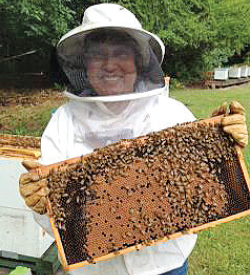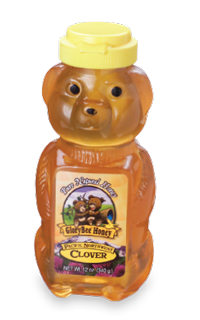Buy honey, save the bee
This article was originally published in April 2016

Each year more than $15 billion worth of essential crops are pollinated by honey bees in the United States, and they produce millions of dollars of honey. One out of every three bites of food Americans consume comes from a plant visited by bees or other pollinators. In recent years, honey bees have faced unprecedented deaths and disappearances. The annual average range of honey bee colony loss over the last five years has been between 30 to 35 percent. A loss of more than 15 percent is considered unsustainable for commercial beekeepers.
GloryBee and Save the Bee
In 2012 GloryBee® launched Save the Bee to support organizations dedicated to saving the honey bee and combating colony collapse issues. Most of the funds raised from the Save the Bee initiative go to Oregon State University’s Honey Bee Lab. The lab:
- Studies the effect of honey bee health and nutrition on colony loss and runs a master beekeeping program. It conducts long-term monitoring of honey bee health and nutrition of commercial beekeeper colonies.
- Helps growers design a bee-friendly insecticide management protocol.
- Manages a publication for growers and beekeepers called “How to Reduce Bee Poisoning” with information on bee toxicity.
A portion of GloryBee’s profits goes to the lab. In the past few years GloryBee has given more than $140,000.
Learn more: GloryBee.com/SaveTheBee.

How you can help
Buy honey! You’ll find GloryBee honey at PCC in jars, squeeze bears and bulk. We carry a variety, including honey from bees that forage on Pacific Northwest blackberries, blueberries and buckwheat blossoms.
PCC offers a variety of types and brands of honey including:
- Raw honey: Honey Gardens Apiaries (Vermont), Craic Honey (Yakima), Oregon Growers & Shippers (Oregon), BeeKing’s (Washington), and My Local Honey (Oregon and Washington).
- Manuka honey: Produced in New Zealand and Australia from the nectar of the manuka tree, this strongly flavored honey is said to have antibacterial and healing properties.
- Certified organic honey: GloryBee (Brazil) and Heavenly Organics (Northern and Central India and parts of the Himalayas).
- Try Grizzlie’s Bee’s Knees Organic Granola. Produced in Eugene, Oregon with raw, whole, organic, local ingredients. A portion of the proceeds from Grizzlie’s granola goes directly toward critical bee research.
Learn more about what makes honey organic or raw, and tips for cooking with honey here.
